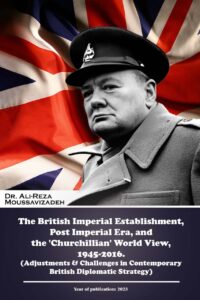British Diplomatic Oil Crisis: Contemporary Anglo-Saxon Geopolitical Rivalries in the Persian Gulf: Drawing a Lesson? Or Sir Anthony Eden‘s Delusion of Grandeur.
source
of energy, as was said before. In these circumstances
they could hardly deny Iran’s right to nationalise. The
Company, on the other hand, argued that the 1933 Concession
was binding under international law and that the government
must stand up firmly for British rights. Besides, the
government owned half of the Anglo-Iranian Oil Company; the
loss of its concession would be a major blow to the British
economy. ‘Britain at the time still owned more overseas
assets than any other country.’
34 To acquiesce in a nationalisation
would be to invite the seizure of more British assets by
other nationalists.
‘The British Government
would not tolerate a complete change
in the Company’s position as provided for in the existing
[i.e. the 1933] Agreement.’ 35 Lord
Salisbury, in the House of Lords, said, ‘unwarranted
interference in the Company’s s affairs in Persia is
deplorably weak.’ 36
Herbert Morrison, the
Foreign Secretary, knew that the
British public would be outraged by any display of apparent
weakness in the face of Iranian high-handedness, and that
this would adversely affect the Labour Party’s election
prospects. The Foreign Secretary informed the Cabinet that
‘all practicable steps would be taken to prevent the
Company’s customers from buying oil from Persian
Government,’ 37 ‘as evidence that
United Kingdom interests could not be recklessly molested
with impunity. Indeed, failure to exhibit firmness in this
34. B. LAPPING, End of
Empire, (London: Paladin
Grafton Books,1989), p.261.
35 . Parliamentary Debates, Commons, Vol. 487,
Cols. 1006- 1014, 1st
May 1951 in H. ENAYAT,
British Public Opinion and the Persian Oil Crisis
, M.Sc. Econ. Thesis, University of London, 1958,
p.110.
-
36. Parliamentary Debates,
Lords, Vol. 172, Col. 681, 5th July 1951, in ibid, p.103. -
37. PRO, London, CAB 128/19 CM (51) 37th
Conclusions, Minute 3, 5th
July 1951, p.96.Pages: 1 2 3 4 5 6 7 8 9 10 11 12 13 14 15 16 17 18 19 20 21 22 23 24 25 26 27 28 29 30 31 32 33 34 35 36 37 38 39 40 41 42 43 44 45 46 47 48 49 50 51 52 53 54 55 56 57 58 59 60 61 62 63 64 65 66 67 68 69 70 71 72 73 74 75 76 77 78 79 80 81 82 83 84 85 86 87 88 89 90 91 92 93 94 95 96 97 98 99 100 101 102 103 104 105 106 107 108 109 110 111 112 113 114 115 116 117 118 119 120 121 122 123 124 125 126 127 128 129 130 131 132 133 134 135 136 137 138 139 140 141 142 143 144 145 146 147 148 149 150 151 152 153 154 155 156 157 158 159 160 161 162 163 164 165 166 167 168 169 170 171 172 173 174 175 176 177

